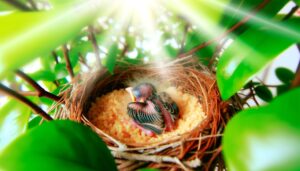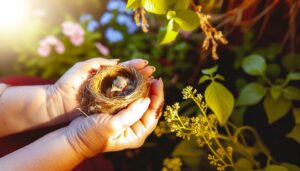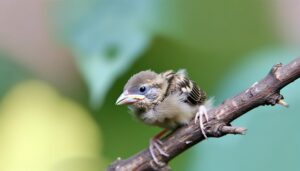Can Baby Sparrows Eat Bread?
Feeding baby sparrows bread isn't advisable due to its insufficient nutritional profile. Bread lacks the proteins, fats, and essential vitamins necessary for their rapid growth and feather development.
It can cause digestive issues, malnutrition, and a weakened immune system, putting the chicks at risk. Instead, opt for high-protein insects like mealworms and crickets, which provide essential amino acids.
Soft seeds such as millet and sunflower supply needed fats and carbohydrates. You should use a sterilized syringe or dropper to feed them every 20-30 minutes.
Ensuring balanced nutrition and clean feeding practices is crucial for healthy development. Learn more for best feeding strategies.
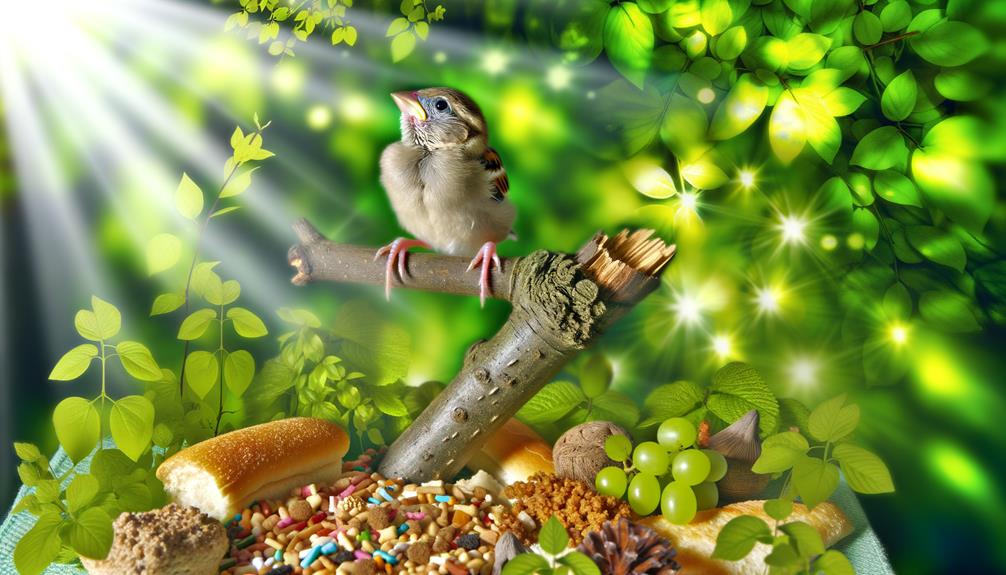
Key Takeaways
- Baby sparrows should not eat bread due to its lack of essential nutrients like protein and fats.
- Bread can lead to malnutrition, stunted growth, and poor feather development in baby sparrows.
- Feeding bread may cause digestive issues and nutritional deficiencies, weakening their immune systems.
- Moldy bread poses additional health risks by introducing harmful mycotoxins.
- Suitable alternatives include insects like mealworms and seeds like millet, which provide necessary proteins, fats, and carbohydrates.
Nutritional Needs of Baby Sparrows
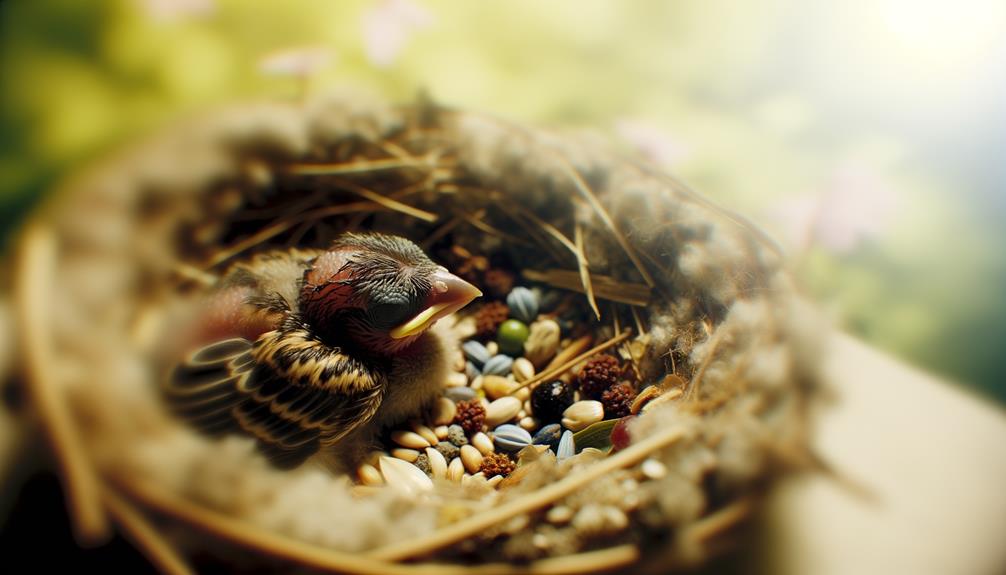
Understanding the nutritional needs of baby sparrows requires a detailed analysis of their diet in the wild. This diet primarily consists of high-protein insects and soft seeds. You need to recognize that protein is essential for their rapid growth and feather development. Insects provide important amino acids that aren't found in many plant-based foods.
Additionally, soft seeds offer necessary fats and carbohydrates, which contribute to energy levels and overall health. It's important to balance these nutrients to guarantee proper development. By focusing on these dietary components, you can better support baby sparrows in their critical early stages.
This scientific approach guarantees that you're providing the right nutrients, fostering their growth, and increasing their chances of survival.
Why Bread Is Inadequate
Why is bread inadequate for baby sparrows?
Bread lacks the essential nutrients that baby sparrows need for proper growth and development. It's primarily composed of carbohydrates, offering little protein and fat, which are essential for feather formation and energy. Bread also doesn't provide the necessary vitamins and minerals, such as calcium and phosphorus, crucial for bone development.
When you feed baby sparrows bread, you're not meeting their dietary requirements.
As a result, they may suffer from malnutrition, leading to stunted growth and weakened immune systems. The absence of diverse nutrients in bread makes it a poor substitute for their natural diet of insects and seeds, which are rich in proteins, fats, and important micronutrients.
Potential Health Risks
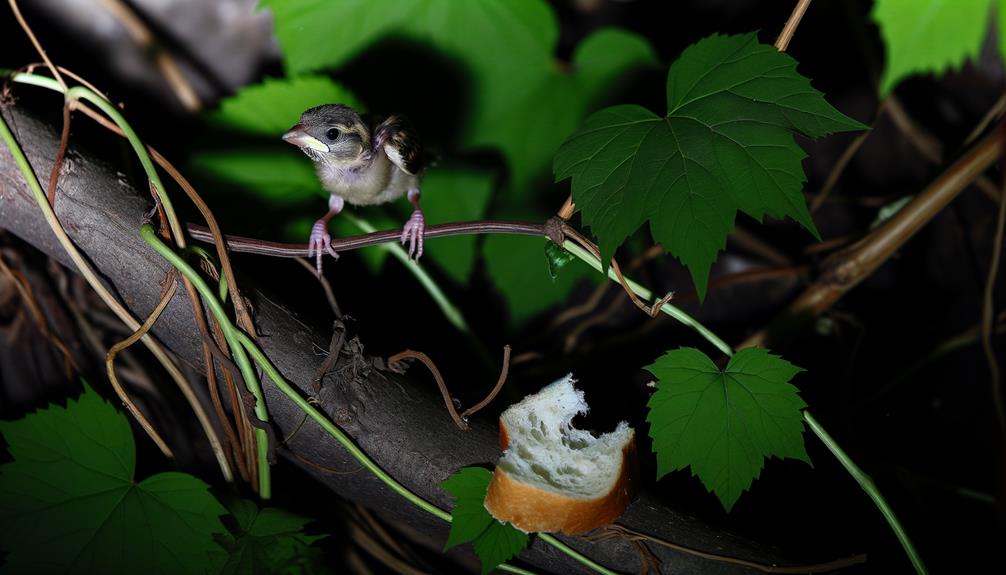
Feeding baby sparrows bread can lead to several potential health risks, including digestive issues and nutritional deficiencies. Bread is low in essential nutrients like proteins, vitamins, and minerals that are pivotal for a baby sparrow's growth and development. This imbalance can result in stunted growth and weakened immune systems.
Additionally, bread can swell in their stomachs, causing bloating and impeding normal digestion. This can lead to malabsorption of nutrients, putting the young birds at further risk. Moldy bread, often overlooked, can introduce harmful mycotoxins into their system, exacerbating these health risks.
Suitable Food Alternatives
To guarantee baby sparrows receive the necessary nutrients for best growth, consider providing them with a diet rich in insects, seeds, and specialized bird formulas. Insects such as mealworms and crickets are excellent protein sources, essential for muscle development. Seeds, especially millet and sunflower, provide key fats and carbohydrates. Specialized bird formulas ensure a balanced intake of vitamins and minerals, promoting overall health.
Here's a quick reference table for suitable food alternatives:
| Food Type | Nutritional Benefit |
|---|---|
| Mealworms | High in protein |
| Crickets | Rich in essential amino acids |
| Millet | Source of carbohydrates |
| Sunflower seeds | High in fats |
| Bird formula | Balanced vitamins and minerals |
These alternatives support optimal growth and development in baby sparrows.
Tips for Feeding Baby Sparrows
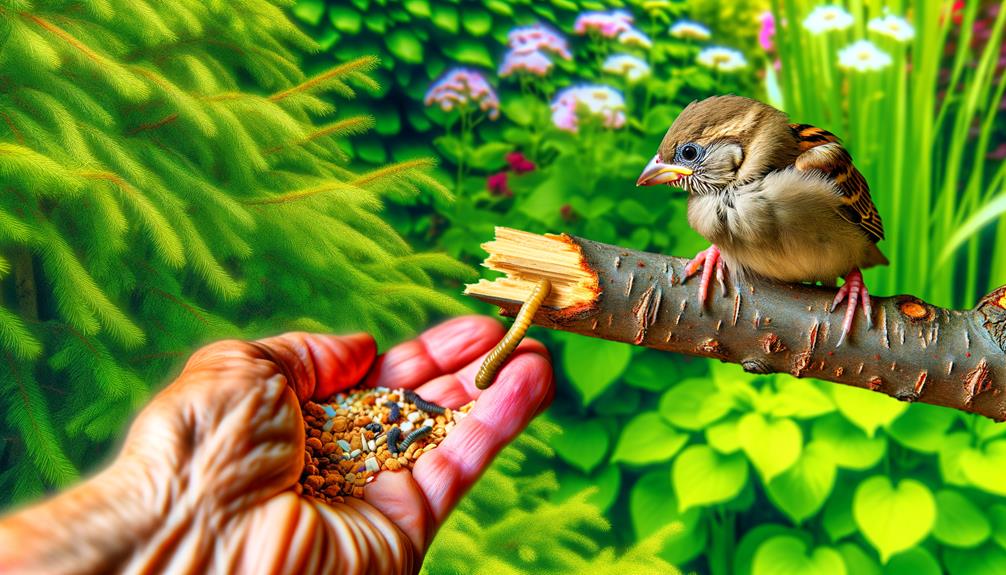
When feeding baby sparrows, it's important to understand the correct techniques to make sure they receive these nutritious alternatives effectively. First, use a small, sterilized syringe or dropper to administer food, mimicking the parents' feeding method.
Make sure the food is at room temperature to prevent digestive issues. Feed them every 20-30 minutes from dawn to dusk, as they require frequent nourishment. Monitor their crop, a small pouch at the base of the throat, to avoid overfeeding; it should be full but not overly distended.
Always provide clean water using a separate dropper to prevent dehydration. Additionally, maintain a clean feeding environment to reduce the risk of infections. By following these steps, you'll help baby sparrows thrive.
Conclusion
Feeding baby sparrows bread might seem convenient, but it's nutritionally inadequate and potentially harmful. Bread lacks crucial proteins and fats, leading to malnutrition.
Instead, consider offering nutrient-rich options like mashed hard-boiled eggs or moistened dog kibble, which support their growth. While bread fills their crops momentarily, quality food fosters strong bones and feathers.
You're not just feeding sparrows; you're nurturing future fliers. Choose wisely to guarantee these delicate creatures thrive, rather than merely survive.

